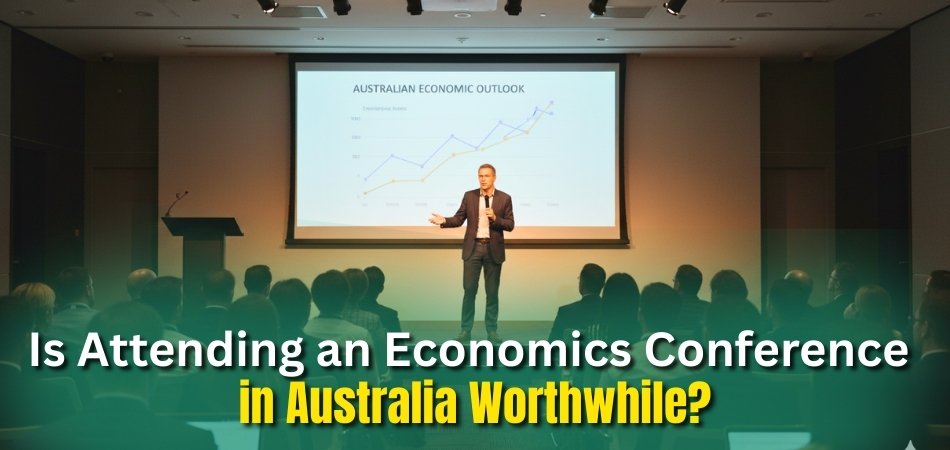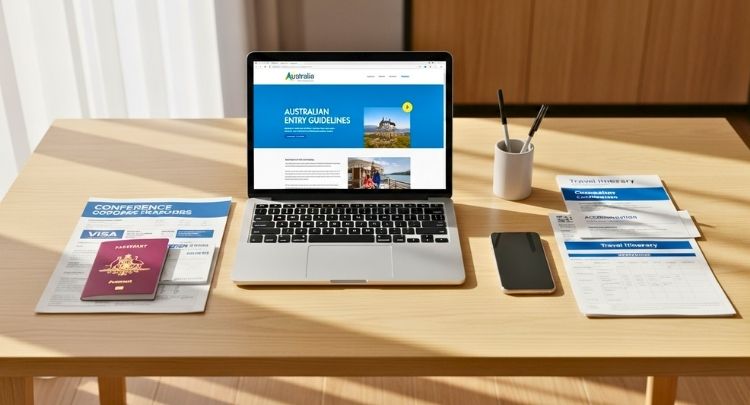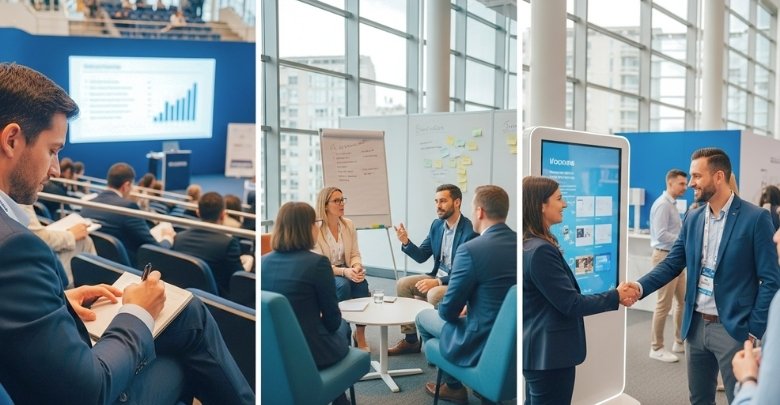Australia has become a dynamic hub for economic discussions, where experts, researchers, and professionals gather to share insights. These conferences explore crucial topics like trade, inflation, and sustainable growth while connecting people from academia and industry. Attendees gain exposure to innovative research, global trends, and real-world policy debates.
If you’re wondering, is attending an economics conference in Australia worthwhile?
Yes, attending an economics conference in Australia is worthwhile. You can learn from top experts, explore new topics like trade and inflation, and meet people who can help your career. These events also help you improve your skills, share your ideas, and stay updated on real-world issues.
Keep reading to discover how these conferences add real value and how you can make the most of your experience in Australia.
Is Attending an Economics Conference in Australia Worthwhile?
Yes, attending an economics conference in Australia is absolutely worthwhile. These events bring together sharp minds, valuable discussions, and practical learning. Participants connect with professionals who share new ideas and approaches that shape future economic thinking. To understand why many attendees find them so valuable, here’s a look at what these conferences truly offer.
Learning From Leading Economists
Australia hosts conferences where global economists share insights on pressing issues. You hear their ideas directly, which improves your understanding of real-world economics. Each talk delivers something new that sparks your curiosity and challenges your thinking. These moments turn ordinary learning into meaningful experiences that stay long after the event ends.
Exploring Diverse Economic Topics
Attendees can explore diverse subjects like trade, inflation, sustainability, and financial reforms. These themes connect theory to practice and reveal how policies affect people’s lives. Each topic encourages deeper thinking and helps participants link global economics with local realities. Such broad exposure strengthens your confidence in applying economics beyond textbooks.
Building Strong Professional Connections
Conferences encourage natural conversations that can lead to partnerships and collaborations. Meeting professionals in person builds trust faster than online introductions. Networking also helps in discovering hidden job opportunities and academic projects. These connections can open doors to long-term professional and research growth.
Improving Research and Presentation Skills
Presenting your research allows you to receive honest feedback from experts. It strengthens your confidence and helps refine your ideas. Attending others’ presentations teaches you how to communicate complex topics clearly and simply. Every session improves your analytical, speaking, and listening skills for future academic success.
Understanding Australia’s Economic Landscape
Australia’s economy offers unique insights into trade relations, sustainability, and financial trends. Conferences here showcase data-driven approaches and policy discussions relevant to the region. Listening to Australian economists helps you compare their strategies with global perspectives. This understanding gives you a balanced view of how regional economies influence the world.
Boosting Career Growth Opportunities
Employers value individuals who engage with academic and professional events. These experiences show commitment, curiosity, and readiness to learn. Participating in conferences helps you stand out during interviews and applications. Over time, these experiences become a strong advantage in professional development and research recognition.
Expanding Your Academic Network in Australia
During these conferences in Australia, you meet local and international participants from varied institutions. Each discussion brings fresh viewpoints that enrich your perspective. Many attendees later collaborate on papers or joint research projects. These relationships often grow into lifelong academic or professional partnerships.
Staying Updated on Global Economic Trends
Every session reflects ongoing global changes in economics, policy, and development. You gain firsthand updates from researchers working on relevant issues. This exposure ensures your knowledge stays sharp and timely. Staying informed like this helps you stay competitive in academic and professional circles.
What Should Be Considered Before Attending a Conference in Australia?
Before attending a conference in Australia, several important factors should be considered to ensure a successful and rewarding experience. Considering these aspects will help optimize the experience and allow for meaningful engagement, learning, and professional growth during the conference in Australia. Here they are:
- Define Objectives: Clearly outline your goals for attending the conference, such as networking, learning, presenting research, or exploring career opportunities. This helps prioritize sessions and interactions.
- Budget Planning: Estimate the total costs, including registration, travel, accommodation, food, and miscellaneous expenses. Allocate funds carefully and plan for contingencies.
- Travel and Documentation: Ensure travel arrangements are confirmed and bring all necessary travel documents, like a valid passport, visa, conference registration, and travel insurance.
- Venue and Logistics: Familiarize yourself with the venue location, facilities, and transportation options. Knowing how to get to and from the venue efficiently will reduce stress.
- Packing Essentials: Prepare suitable clothing according to Australia’s climate and conference dress code, presentation materials if needed, electronic devices with chargers and adapters, networking tools like business cards and notebooks, as well as personal care items.
- Conference Agenda: Review the conference schedule and speakers in advance to plan which sessions to attend. Prioritize events that align with your objectives.
- Networking Preparation: Have your business cards ready and prepare strategies to meet relevant people. Networking is often a key benefit of attending conferences.
- Staying Organized: Bring organizers or folders for managing documents such as schedules, notes, and contact information. Snacks and water can help maintain energy levels during long sessions.
Who Should Attend an Economics Conference in Australia?
Learning about economics becomes more interesting when you meet people who live and work with these ideas. Conferences in Australia give you that chance through friendly talks and open discussions. You’ll meet experts, students, and professionals who love sharing what they know. Here are the people who should attend the conference to gain the most.
Academic Economists
Professors, researchers, and postdoctoral fellows find these conferences perfect for sharing their work and ideas. They can present their studies, get feedback, and discuss new topics with others in their field. It’s a great way to meet people who care about the same subjects. Many academic economists attend to learn what’s new and to make their research stronger.
Graduate Students
Students doing master’s or PhD programs in economics can learn a lot here. They see how classroom theories work in real life. Many students also get to show their early research and get helpful advice from professionals. It’s a friendly space to meet mentors, make friends, and build confidence in their studies.
Policy Makers
Government workers and policy makers come to understand what current research means for real problems in the country. They listen to experts talk about trade, inflation, jobs, and growth. These sessions help them design smarter and fairer public policies. It’s a place where learning leads to better decisions for everyone.
Central Bank Economists
People working in central banks attend to learn more about money, inflation, and market changes. They hear from leading economists who study finance and trade. The talks help them improve how they plan, report, and predict future trends. It keeps them updated with ideas that can guide strong financial systems.
Private Sector Economists
Economists working in businesses and companies join to understand market changes and consumer behavior. They listen to experts who explain how world events affect prices and trade. This helps them make smart decisions for their company’s growth. They also find partners or clients who share their business goals and ideas.
NGO and Development Experts
People working with non-profit groups or development projects come to learn about issues like poverty and fair growth. They join talks that focus on helping communities and improving living standards. By learning from research and experts, they plan better programs. It’s about finding real solutions that make people’s lives better.
Curious Learners
Not everyone at these conferences is a professional or researcher. Many curious people attend just because they want to learn and explore new ideas. By attending an economics event in Australia, they can listen to simple talks about how economies work and affect daily life. It’s a fun, clear way to stay informed and understand the world better.
Comparing Australian Conferences to Other Regions
Economics conferences happen all over the world, but each region offers something different. Australia stands out for its balance between learning quality, networking, and a welcoming environment. While other regions have bigger events, Australia provides a friendly space where ideas are easier to share and understand. Take a look at this comparison for a better understanding.
| Aspect | Australia | Asia / Europe / U.S. | Key Takeaway |
| Cost and Travel | Usually more affordable, with moderate travel and accommodation costs. Student discounts make attending easier for young researchers. | Travel and participation costs are often higher, especially in Europe and the U.S., with fewer budget options. | Australia offers good value and accessibility for students and early-career professionals. |
| Learning Environment | Smaller sessions encourage open discussion, interaction, and easy communication with speakers. | Large, crowded sessions can feel formal, making it harder to ask questions or engage freely. | Australia provides a friendlier and more personal learning experience. |
| Research Collaboration | Strong links with Asia-Pacific universities and research centers lead to practical projects and partnerships. | Collaborations exist but are often limited to established academic circles and selective research groups. | Australian conferences open more doors for global research collaboration. |
| Diversity and Inclusion | Welcomes participants from many cultures, creating lively and open exchanges of ideas. | Europe and U.S. events are diverse but can feel more formal or competitive. | Australia offers a relaxed, inclusive space for genuine conversations. |
| Practical Relevance | Focus on issues like trade, climate, and employment that connect directly to the Asia-Pacific region. | Broader global topics are covered, but may feel distant from local and regional concerns. | Australian conferences emphasize practical and current economic discussions. |
How to Choose the Right Economics Conference in Australia?
Finding the right economics conference can feel tricky when there are so many choices across Australia. Each event offers different ideas, speakers, and goals. Picking the right one helps you learn better and meet people who fit your interests. Here’s how you can make a smart and simple choice.
- Know Your Goal: Think about what you want from the event—learning, presenting, or networking. Clear goals help you find a conference that matches your needs easily.
- Check Conference Type: Every conference has its focus, like research, policy, or business. Understanding its main theme helps you join the right crowd for your interests.
- Look at Speakers: Good speakers make sessions exciting and helpful for everyone. Reading their topics before joining ensures you’ll learn things that truly matter.
- Review Past Events: Check old photos, videos, or reports from earlier years. Seeing what happened before gives clues about what you’ll experience this time.
- Think About Cost: Every event has a fee, and travel adds more. Planning early and comparing options helps you stay within your budget comfortably.
- See Participant Mix: Some events focus on students, others on professionals or researchers. Knowing the crowd helps you feel comfortable and connect with suitable people.
- Check Location & Time: The place and timing should fit your schedule and travel comfort. Choose cities or months that make the trip enjoyable and easier.
- Read Program Details: The session list tells you what topics will be discussed. Reading them helps you pick one that fits your learning interests.
- Look for Networking: Events with discussion sessions or small group meetings are very useful. They help you build real connections and share ideas openly.
Tips to Maximize Your Conference Experience
Attending a conference becomes truly valuable when you prepare, stay alert, and connect meaningfully with others. Each talk, discussion, or meeting can help you grow in understanding and confidence. Here are some simple and smart tips to make your conference experience more rewarding and enjoyable.
Plan Before You Go
- Review the conference schedule and mark sessions that match your interests. Planning early saves time and keeps your focus strong throughout.
- Learn about the speakers and their work before attending. This preparation helps you ask better questions and understand their points clearly.
Stay Curious During Sessions
- Listen carefully to different topics and compare them with your own knowledge. Every session can bring new ideas worth exploring later.
- Write short notes during important discussions. It helps you remember useful examples and connect them easily when studying later.
Meet and Talk to People
- Start conversations during breaks with attendees near you. Simple greetings often lead to great discussions and helpful new friendships.
- Ask people about their work and experiences rather than only sharing yours. Listening closely often builds stronger and longer-lasting connections.
Participate in Q&A Sessions
- Ask short, clear questions that show genuine curiosity. It helps speakers remember you and opens chances for further discussion later.
- Respect other participants’ time by keeping your question focused. This way, the session remains smooth and everyone benefits equally.
Use Technology Wisely
- Save presentation slides, notes, or recordings when possible. They become valuable references when you review or write about topics later.
- Connect with speakers and participants through online platforms. It helps you stay in touch and continue conversations after the conference.
Manage Your Time Well
- Balance learning sessions with breaks to avoid exhaustion. Resting properly helps your brain process new ideas more effectively afterward.
- Arrive early to avoid missing key sessions or speakers. Staying punctual also leaves a positive impression on organizers and peers.
Explore Local Opportunities
- Spend time discovering nearby universities or research centers if possible. Such visits can inspire new interests and future collaborations.
- When finding top economics conferences in Australia, check nearby academic events or workshops that fit your learning goals easily.
Follow Up After the Event
- Send short thank-you messages to new contacts you met. It shows appreciation and keeps your communication friendly and meaningful.
- Review your notes within a few days. Reflecting early helps you remember key lessons and apply them in practical ways.
Frequently Asked Questions
Many readers often wonder about the value, benefits, and details of attending economics conferences in Australia. These questions highlight what people want to know before deciding to join one. Here are some simple and helpful answers to guide you further.
What Can I Expect From My First Economics Conference In Australia?
You can expect friendly people, interesting talks, and open discussions. The sessions include current topics like trade, finance, and policy. You’ll meet experts, students, and professionals who enjoy learning and sharing. It’s both educational and enjoyable.
Are There Student-Friendly Opportunities At Australian Economics Conferences?
Yes, many conferences welcome students and offer discounts or special sessions. Students can present early research, attend mentorship programs, and join group discussions. These opportunities help build confidence, improve understanding, and connect with academic professionals in simple, encouraging ways.
How Can Attending An Australian Economics Conference Help My Career?
It can boost your confidence and open career doors through networking and learning. You’ll meet experts who can offer advice, collaborations, or recommendations. Employers also value active learners, making your conference participation a strong point on your resume.
Do Australian Economics Conferences Include Global Economic Topics?
Yes, they cover both Australian and global issues like trade, inflation, and economic development. Many speakers come from around the world, offering broad perspectives. This balance gives you a full understanding of how different economies connect and influence each other.
How Early Should I Register For An Economics Conference In Australia?
It’s best to register two to three months before the event. Early registration ensures lower fees, better travel plans, and access to key sessions. Planning ahead also gives you time to prepare questions or even submit research proposals.
Closing Remarks
Attending an economics conference in Australia can be a really good experience for anyone who wants to learn and grow. You get useful ideas, meet kind people, and understand real economic problems in simple ways. These events make learning fun and help you think differently about big topics.
Students, teachers, and workers can all find something helpful there. When we think about is attending an economics conference in Australia worthwhile, the answer feels clear. Yes, it is worth it because you learn, share, and meet people who inspire you. Every moment teaches something new and meaningful.








